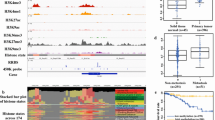Abstract
Previous researches showed T-cadherin (CDH13) expression was downregulated in colon cancer tissues and was associated with increase of invasive and metastatic potential. This research was to observe the mechanisms responsible for inactivation of T-cadherin gene in colon carcinoma; we investigated the methylation status around the 5′ promoter region of T-cadherin gene of Hct116 colon cancer cell line by methylation-specific polymerase chain reaction (MSP), also detected the expression change of T-cadherin mRNA and protein in Hct116 cell line after 5-Aza-CdR treatment by reverse transcriptase polymerase chain reaction and Western blotting, and compared the T-cadherin methylation status with T-cadherin mRNA and protein expression. We found that hypermethylation of T-cadherin was involved in Hct116 cell line, while T-cadherin mRNA and protein expression was almost lost or downregulated in Hct116 cell line. Therefore, methylation of the T-cadherin promoter region was correlated with the loss or downregulation of T-cadherin mRNA and protein expression in Hct116 colon cancer cell line. Treatment of T-cadherin-negative carcinoma cells with the demethylating agent, 5-aza-2′-deoxycytidine, induced re-expression of this gene. Our findings demonstrate that 5′ CpG island methylation is common in colon carcinoma and may play an important role in the inaction of T-cadherin. Our results also suggest that demethylation of the T-cadherin gene may be a potential therapeutic strategy for colon carcinoma.



Similar content being viewed by others
References
Mancini DN, Rodenhiser DI, Ainsworth PJ, et al. CpG methylation within the 5’ regulatory region of the BRCA1 gene is tumor specific and includes a putative CREB binding site [J]. Oncogene. 1998;16(9):1161–9.
Suske G. The Sp-family of transcription factor [J]. Gene. 1999;238(2):291–300.
Takeichi M. Cadherin cell adhesion receptors as a morphogenetic regulator. Science. 1991;251:1451–5.
Levenberg S, Yarden A, Kam Z, et al. p27 is involved in N-cadherin-mediated contact inhibition of cell growth and S-phase entry. Oncogene. 1999;18:869–76.
Takeichi M. Cadherins in cancer: implications for invasion and metastasis. Curr Opin Cell Biol. 1993;5:806–11.
Behrens J. The role of cell adherin molecules in cancer invasion and metastasis. Breast Cancer Res Treat. 1993;24:175–84.
Lee SW. H-Cadherin, a novel cadherin with growth inhibitory functions and diminished expression in human breast cancer. Nat Med. 1996;2:776–82.
Toyooka KO, Toyooka S, Virmani AK, et al. Loss of expression and aberrant methylation of the CDH13 (H-cadherin) gene in breast and lung carcinomas. Cancer Res. 2001;61:4556–60.
Kawakami M, Staub J, Cliby W, et al. Involvement of H-cadherin (CDH13) ON 16q in the region of frequent deletion in ovarian cancer. Int J Oncol. 1999;15:715–20.
Roman-Gomez J, Castillejo JA, Jimenez A, et al. Cadherin-13, a mediator of calcium-dependent cell-cell adhesion, is silenced by methylation in chronic myeloid leukemia and correlates with pretreatment risk profile and cytogenetic response to interffero alfa. J Clin Oncol. 2003;21:1472–9.
Sakai M, Hibi K, Koshikawa K, et al. Frequent promoter methylation and gene silencing of CDH13 in pancreatic cancer. Cancer Sci. 2004;95(7):588–91.
Toyooka KO, Toyooka S, Virmani AK, et al. Loss of expression and aberrant methylation of the CDH13 (H-cadherin) gene in breast and lung carcinomas. Cancer Res. 2001;61:4556–60.
Sato M, Mori Y, Sakurada A, et al. The H-cadherin (CDH13) gene is inactivated in human lung cancer. Hum Genet. 1998;103:96–101.
Mollerup S, Ryberg D, Hewer A, et al. Sex differences in lung CYP1A1 expression and DNA adduct levels among lung cancer patients. Cancer Res. 1999;59:3317–20.
Hibi K, Takahashi T, Sekido Y, et al. Coexpression of the stem cell factor and the c-kit genes in small-cell lung cancer. Oncogene. 1991;6:2291–6.
Lee S, Hwang KS, Lee HJ, et al. Aberrant CpG island hypermethylation of multiple genes in colorectal neoplasia. Lab Investig. 2004;84:884–93.
Angst BD, Marcozzi C, Magee AI. The cadherin superfamily: diversity in form and function. J Cell Sci. 2001;114(Pt4):629–41.
Perl AK, Wilgenbus P, Dahl U, et al. A causal role for E-cadherin in the transition from adenoma to carcinoma [J]. Nature. 1998;392:190–3.
Frixen U, Behren J, Sachs M, et al. E-cadherin-mediated cell-cell adhesion prevents invasiveness of human carcinoma cells. J Cell Biol. 1991;113:173–85.
Beavon IR. Regulation of E-cadherin: does hypoxia initiate the metastatic cascade? Mol Pathol. 1999;52:179–88.
Kinsella AR, Iets GC, Hill CL, et al. Reduced E-cadherin expression correlates with increased invasivenessin colorectal carcinoma cell lines. Clin Exp Metastasis. 1994;12(4):335–42.
Herman JG, Graff JR, Myohanen S, et al. Methylation-specific PCR: a novel PCR assay for methylation status of CpG islands. Proc Natl Acad Sci USA. 1996;93:9821–6.
Hibi K, Taguchi M, Nakayama H, et al. Molecular detection of p16 promoter methylation in the serum of patients with esophageal squamous cell carcinoma. Clin Cancer Res. 2001;7:3135–8.
Nakayama H, Hibi K, Takase T, et al. Molecular detection of p16 promoter methylation in the serum of recurrent colorectal cancer patients. Int J Cancer. 2003;105:491–3.
Klump B, Hsieh CJ, Nehls O, et al. Methylation status of p14ARF and p16INK4a as detected in pancreatic secretions. Br J Cancer. 2003;88:217–22.
Author information
Authors and Affiliations
Corresponding author
Rights and permissions
About this article
Cite this article
Ren, Jz., Huo, Jr. Correlation between T-cadherin gene expression and aberrant methylation of T-cadherin promoter in human colon carcinoma cells. Med Oncol 29, 915–918 (2012). https://doi.org/10.1007/s12032-011-9836-9
Received:
Accepted:
Published:
Issue Date:
DOI: https://doi.org/10.1007/s12032-011-9836-9




